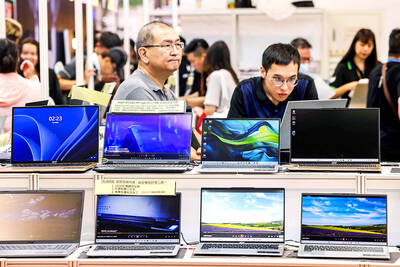Grim economic news from around the world sent the US dollar mostly higher on Friday while the yen regained favor as a safe haven investment, analysts said.
Jittery traders rushed into the greenback and yen after news of a dismal 6.2 percent annualized fourth-quarter contraction in the US economy and more troubling economic data from Europe.
The euro fell to US$1.2671 at 10pm GMT from US$1.2743 late on Thursday. The dollar dipped to ¥97.65 from ¥98.46 on Thursday.
The market action came after news of a sharper-than-expected 6.2 percent contraction in the US economy in the fourth quarter, highlighting the stunning meltdown in activity late last year.
In late New York trading, the dollar stood at 1.1701 Swiss francs after SF1.1644 on Thursday.
The pound was at US$1.4310 after US$1.4322.
Asian currencies fell this month, with South Korea’s won tumbling to an 11-year low and the Indian rupee dropping to a record, on concern sliding exports and shrinking economies will deter investment.
The Bloomberg-JPMorgan Asia Dollar Index, which tracks the region’s 10 most-active currencies excluding the yen, slumped to a four-year low on Friday as global funds favored safer bets than emerging-market assets. Government reports this week showed India’s economy expanded at the slowest pace since 2003, Singapore’s had the biggest quarterly contraction in at least 33 years, and Hong Kong’s exports fell the most in half a century.
The won fell 1.1 percent to 1,534 against the US dollar on Friday, according to Seoul Money Brokerage Services Ltd. It reached 1,544, the weakest since March 1998. India’s rupee declined 1.3 percent to 51.15, extending its loss this month to 4.4 percent.
Eight of the 10 most-active Asian currencies dropped against the dollar this month. China’s yuan and the Hong Kong dollar, which is pegged to the greenback, were little changed.
The MSCI Asia-Pacific Index of regional shares slid 7.4 percent this month, taking its loss for the year to 16 percent. The benchmark plunged 43 percent in 2008.
India’s economy, Asia’s third-largest, expanded 5.3 percent from a year earlier in the last quarter, the government said on Friday. Singapore’s gross domestic product declined an annualized 16 percent during the three-month period and Hong Kong’s exports in January tumbled 22 percent, separate reports showed.
The New Taiwan dollar dropped as low as NT$35.008 on Friday, the weakest since April 2003, according to Taipei Forex Inc. The NT dollar closed 0.3 percent lower versus the greenback at NT$34.95 on Friday, capping a 3.3 percent drop for the month.
Indonesia’s rupiah dropped 4.5 percent this month to 11,980 to the dollar, according to data compiled by Bloomberg. The rupiah had a seventh weekly decline, the longest losing streak since November 2007.
Malaysia’s ringgit declined 2.6 percent this month and reached 3.7065 per dollar on Friday, the lowest since March 2006.
Thailand’s baht sank to a two-year low of 36.18 per dollar on Friday, having lost 3.3 percent this month. The Philippine peso slid 2.9 percent to 48.798. China’s yuan was little changed for the month at 6.8398.

TECH TITAN: Pandemic-era demand for semiconductors turbocharged the nation’s GDP per capita to surpass South Korea’s, but it still remains half that of Singapore Taiwan is set to surpass South Korea this year in terms of wealth for the first time in more than two decades, marking a shift in Asia’s economic ranks made possible by the ascent of Taiwan Semiconductor Manufacturing Co (TSMC, 台積電). According to the latest forecasts released on Thursday by the central bank, Taiwan’s GDP is expected to expand 4.55 percent this year, a further upward revision from the 4.45 percent estimate made by the statistics bureau last month. The growth trajectory puts Taiwan on track to exceed South Korea’s GDP per capita — a key measure of living standards — a

READY TO HELP: Should TSMC require assistance, the government would fully cooperate in helping to speed up the establishment of the Chiayi plant, an official said Taiwan Semiconductor Manufacturing Co (TSMC, 台積電) yesterday said its investment plans in Taiwan are “unchanged” amid speculation that the chipmaker might have suspended construction work on its second chip packaging plant in Chiayi County and plans to move equipment arranged for the plant to the US. The Chinese-language Economic Daily News reported earlier yesterday that TSMC had halted the construction of the chip packaging plant, which was scheduled to be completed next year and begin mass production in 2028. TSMC did not directly address whether construction of the plant had halted, but said its investment plans in Taiwan remain “unchanged.” The chipmaker started

MORTGAGE WORRIES: About 34% of respondents to a survey said they would approach multiple lenders to pay for a home, while 29.2% said they would ask family for help New housing projects in Taiwan’s six special municipalities, as well as Hsinchu city and county, are projected to total NT$710.65 billion (US$23.61 billion) in the upcoming fall sales season, a record 30 percent decrease from a year earlier, as tighter mortgage rules prompt developers to pull back, property listing platform 591.com (591新建案) said yesterday. The number of projects has also fallen to 312, a more than 20 percent decrease year-on-year, underscoring weakening sentiment and momentum amid lingering policy and financing headwinds. New Taipei City and Taoyuan bucked the downturn in project value, while Taipei, Hsinchu city and county, Taichung, Tainan and Kaohsiung

Micro-Star International Co (MSI, 微星科技) is expanding notebook computer production in India after partnering with Indian electronics maker Syrma SGS Technology Ltd late last year, as the Taiwanese company seeks to tap into the local market. MSI also plans to manufacture some of its new gaming PCs powered by Nvidia Corp’s RTX 50 graphics cards in India, while adding more advanced and design-focused PCs and notebooks at Syrma’s plant in Chennai, a source told the Taipei Times yesterday on condition of anonymity. MSI’s deployment in India is driven not only by cost advantages, but also by India’s rapidly expanding consumer market and